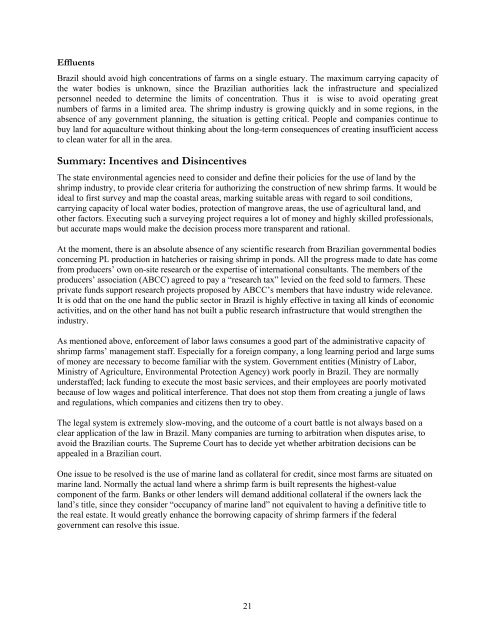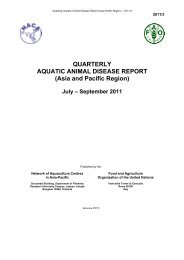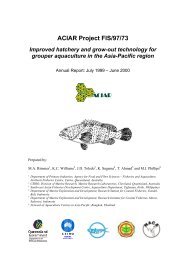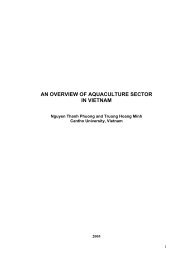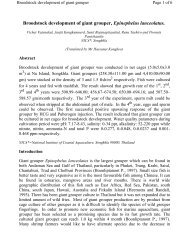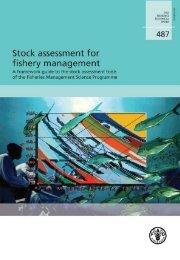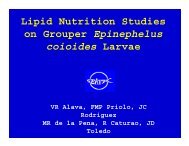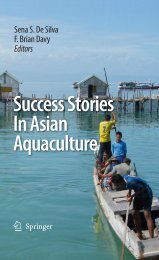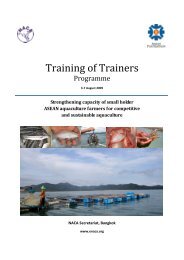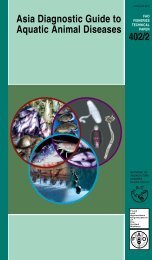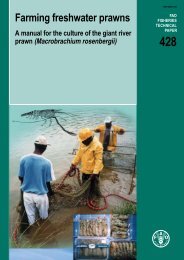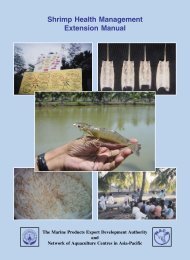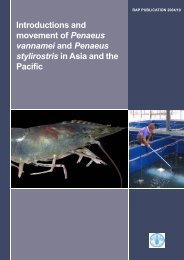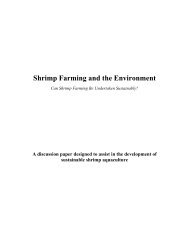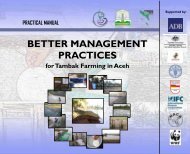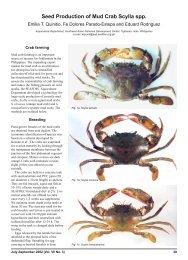Shrimp Farming in Brazil: An Industry Overview - Library - Network of ...
Shrimp Farming in Brazil: An Industry Overview - Library - Network of ...
Shrimp Farming in Brazil: An Industry Overview - Library - Network of ...
Create successful ePaper yourself
Turn your PDF publications into a flip-book with our unique Google optimized e-Paper software.
Effluents<br />
<strong>Brazil</strong> should avoid high concentrations <strong>of</strong> farms on a s<strong>in</strong>gle estuary. The maximum carry<strong>in</strong>g capacity <strong>of</strong><br />
the water bodies is unknown, s<strong>in</strong>ce the <strong>Brazil</strong>ian authorities lack the <strong>in</strong>frastructure and specialized<br />
personnel needed to determ<strong>in</strong>e the limits <strong>of</strong> concentration. Thus it is wise to avoid operat<strong>in</strong>g great<br />
numbers <strong>of</strong> farms <strong>in</strong> a limited area. The shrimp <strong>in</strong>dustry is grow<strong>in</strong>g quickly and <strong>in</strong> some regions, <strong>in</strong> the<br />
absence <strong>of</strong> any government plann<strong>in</strong>g, the situation is gett<strong>in</strong>g critical. People and companies cont<strong>in</strong>ue to<br />
buy land for aquaculture without th<strong>in</strong>k<strong>in</strong>g about the long-term consequences <strong>of</strong> creat<strong>in</strong>g <strong>in</strong>sufficient access<br />
to clean water for all <strong>in</strong> the area.<br />
Summary: Incentives and Dis<strong>in</strong>centives<br />
The state environmental agencies need to consider and def<strong>in</strong>e their policies for the use <strong>of</strong> land by the<br />
shrimp <strong>in</strong>dustry, to provide clear criteria for authoriz<strong>in</strong>g the construction <strong>of</strong> new shrimp farms. It would be<br />
ideal to first survey and map the coastal areas, mark<strong>in</strong>g suitable areas with regard to soil conditions,<br />
carry<strong>in</strong>g capacity <strong>of</strong> local water bodies, protection <strong>of</strong> mangrove areas, the use <strong>of</strong> agricultural land, and<br />
other factors. Execut<strong>in</strong>g such a survey<strong>in</strong>g project requires a lot <strong>of</strong> money and highly skilled pr<strong>of</strong>essionals,<br />
but accurate maps would make the decision process more transparent and rational.<br />
At the moment, there is an absolute absence <strong>of</strong> any scientific research from <strong>Brazil</strong>ian governmental bodies<br />
concern<strong>in</strong>g PL production <strong>in</strong> hatcheries or rais<strong>in</strong>g shrimp <strong>in</strong> ponds. All the progress made to date has come<br />
from producers’ own on-site research or the expertise <strong>of</strong> <strong>in</strong>ternational consultants. The members <strong>of</strong> the<br />
producers’ association (ABCC) agreed to pay a “research tax” levied on the feed sold to farmers. These<br />
private funds support research projects proposed by ABCC’s members that have <strong>in</strong>dustry wide relevance.<br />
It is odd that on the one hand the public sector <strong>in</strong> <strong>Brazil</strong> is highly effective <strong>in</strong> tax<strong>in</strong>g all k<strong>in</strong>ds <strong>of</strong> economic<br />
activities, and on the other hand has not built a public research <strong>in</strong>frastructure that would strengthen the<br />
<strong>in</strong>dustry.<br />
As mentioned above, enforcement <strong>of</strong> labor laws consumes a good part <strong>of</strong> the adm<strong>in</strong>istrative capacity <strong>of</strong><br />
shrimp farms’ management staff. Especially for a foreign company, a long learn<strong>in</strong>g period and large sums<br />
<strong>of</strong> money are necessary to become familiar with the system. Government entities (M<strong>in</strong>istry <strong>of</strong> Labor,<br />
M<strong>in</strong>istry <strong>of</strong> Agriculture, Environmental Protection Agency) work poorly <strong>in</strong> <strong>Brazil</strong>. They are normally<br />
understaffed; lack fund<strong>in</strong>g to execute the most basic services, and their employees are poorly motivated<br />
because <strong>of</strong> low wages and political <strong>in</strong>terference. That does not stop them from creat<strong>in</strong>g a jungle <strong>of</strong> laws<br />
and regulations, which companies and citizens then try to obey.<br />
The legal system is extremely slow-mov<strong>in</strong>g, and the outcome <strong>of</strong> a court battle is not always based on a<br />
clear application <strong>of</strong> the law <strong>in</strong> <strong>Brazil</strong>. Many companies are turn<strong>in</strong>g to arbitration when disputes arise, to<br />
avoid the <strong>Brazil</strong>ian courts. The Supreme Court has to decide yet whether arbitration decisions can be<br />
appealed <strong>in</strong> a <strong>Brazil</strong>ian court.<br />
One issue to be resolved is the use <strong>of</strong> mar<strong>in</strong>e land as collateral for credit, s<strong>in</strong>ce most farms are situated on<br />
mar<strong>in</strong>e land. Normally the actual land where a shrimp farm is built represents the highest-value<br />
component <strong>of</strong> the farm. Banks or other lenders will demand additional collateral if the owners lack the<br />
land’s title, s<strong>in</strong>ce they consider “occupancy <strong>of</strong> mar<strong>in</strong>e land” not equivalent to hav<strong>in</strong>g a def<strong>in</strong>itive title to<br />
the real estate. It would greatly enhance the borrow<strong>in</strong>g capacity <strong>of</strong> shrimp farmers if the federal<br />
government can resolve this issue.<br />
21


